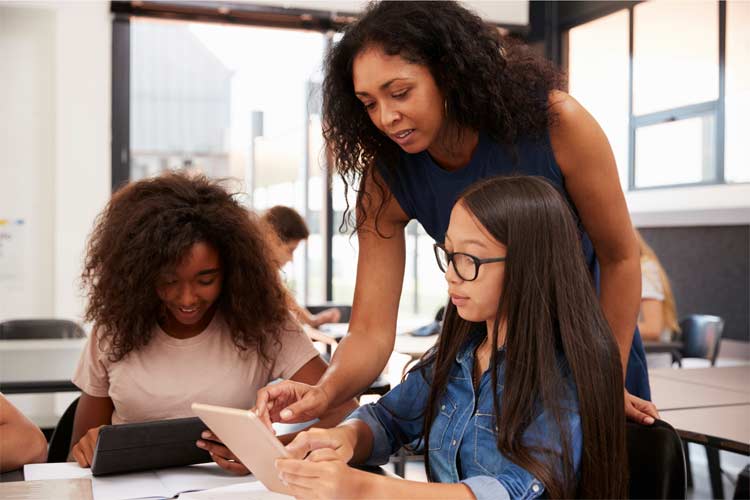Secure your Child's Spot in our Winter Camps! Click here!

What we're talking about!
Check back often for updates!

Recently I was on a panel discussion on Artificial Intelligence and Technology, hosted by the Chamber of Commerce. During the panel, we explored key questions about how AI is shaping industries, the role of technology in education, and how small businesses can leverage AI for growth. One of the central takeaways was the urgent need to educate students about AI, not just in terms of its capabilities but also in understanding its ethical implications. If we want the next generation to be informed users and creators of technology, we must integrate AI literacy into education, teaching students to think critically about how technology influences their lives.
Technology is no longer the future; it's the present. Our kids are growing up in a world where smartphones, tablets, and computers are ubiquitous. While this digital landscape offers incredible opportunities for learning, creativity, and connection, it also presents challenges that parents need to be aware of. At PopSmartKids, we believe in empowering children to become responsible and confident digital citizens.
If we want the next generation to be informed users and creators of technology, we must integrate AI literacy into education, teaching students to think critically about how technology influences their lives. Here are some tips.
Digital literacy is the foundation of confident and responsible online behavior. Children need to understand how to effectively use technology for research, communication, and creative expression. Teaching them the basics of evaluating online information—such as checking sources, recognizing bias, and identifying misinformation—empowers them to make informed decisions in the digital space.
Good manners extend beyond face-to-face interactions. Teaching kids how to communicate respectfully online is vital for maintaining positive digital relationships. Simple practices like using kind language, avoiding caps lock to express anger, and thinking before posting can go a long way in fostering a healthy online presence. Online communities can be a wonderful place to connect and hang out if we are all diligent about creating a supportive and respectful digital environment.
Children must understand the importance of safeguarding their personal information online. Explain concepts like strong passwords, privacy settings, and the risks of sharing too much on social media. Role-playing scenarios can help make this lesson engaging and memorable. For instance, ask them to decide whether they’d share certain details with a stranger in real life to illustrate why it’s equally risky online.
The digital world is brimming with content, but not all of it is credible or appropriate. Encourage kids to question the intent and accuracy of the information they encounter. Games and activities that involve analyzing advertisements, identifying fake news, or exploring credible websites can sharpen their critical thinking skills.
One of the most important lessons for children is understanding that their digital footprint is permanent. Help them grasp the long-term consequences of their online actions, whether it’s sharing a post, commenting on a video, or liking a picture. Real-world examples can drive home the point that what they do online can impact their future.
Technology is a tool, not a replacement for real-world interactions. Teach kids to strike a balance between screen time and offline activities. Encourage hobbies, physical exercise, and face-to-face conversations to ensure they lead well-rounded lives. Encourage tech-free zones or times, such as during meals, before bedtime, or when spending time with family.
As adults, we play a crucial role in modeling responsible digital behavior. Demonstrate the habits you want your children to emulate—whether it’s being mindful of screen time, avoiding oversharing, or handling disagreements online with grace. Your actions speak louder than words and can inspire kids to adopt similar practices.
Digital tools can be incredible aids for learning. Introduce children to educational apps, coding games, and online workshops that help them build skills and explore their passions. At PopSmartKids Academy, we incorporate technology in our classes to show how it can be a force for creativity and growth.
Confidence comes from practice and familiarity. Encourage kids to take small steps—whether it’s writing their first email, participating in an online discussion, or creating a digital project. Celebrate their successes and guide them through challenges to help them feel secure in their abilities. Think of developing technology skills as essential life-building activities that will set children up for success. Just like learning to read, write, or problem-solve, gaining proficiency with technology is a fundamental skill that prepares them for the future.
Helping kids navigate the digital world with confidence and responsibility is not just about teaching them to use technology but also about instilling values that will serve them for a lifetime. As parents and educators we must commit to nurturing well-rounded individuals who are not only tech-savvy but also ethically grounded. By equipping children with the right skills and mindset, we can empower them to harness the power of technology to achieve their dreams while contributing positively to the world around them.
Inspiring kids to stay curious, learn, and communicate effectively is a core part of my mission, which is why our winter camps are packed with engaging activities designed to spark creativity and curiosity. These camps aim to nurture the next generation of thinkers and explorers. Interested in learning more about what we offer? Learn more here.
Help your kids fall in love with reading!
Need a list of amazing books to get your kids inspired about writing their own stories?
Grab your free copy by completing the form.
We'll email you the ebook!